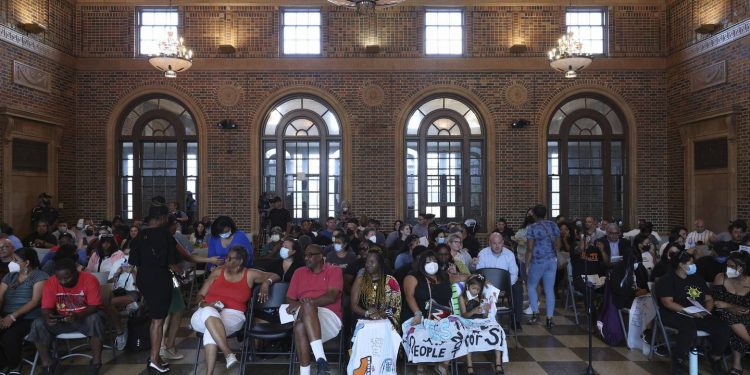A Chicago Park District community forum Wednesday evening in the West Side’s Douglass Park turned contentious over the debate about large music festivals that occupy the park for much of the summer.
Hundreds attended the listening session at the Douglass Park Fieldhouse, 1401 S. Sacramento Ave., one of many the department plans to host across the city, park officials said.
Attendees signed up for two-minute speaking slots to raise their questions, concerns and suggestions about park management. Attendees had red and green cards to demonstrate their support or disagreement with the speakers that were provided by Únete La Villita, a local organization that wants the festivals removed, to try to quell the sound reverberations in the cavernous space.
Chicago Park District Superintendent aAmad CEO Rosa Escareño opened the meeting with invitations to “look into the future and see how we want to transform.”
But as her opening remarks went on, she continuously brought up what one speaker would later call “the elephant in the room”: the growing movement to remove music festivals from Douglass Park.
Indeed, nearly all of the remarks were from residents speaking in favor of or against the festivals. Green cards shot up across the room as the first speaker Denise Ferguson pleaded, “What will it take to get mega fests out of our parks?”
The majority of those who spoke wanted them removed, bringing forward complaints of lack of access to the park, disruptions to two nearby hospitals, traffic, parking tickets and lack of investment of the money back into the park.
Ald. Monique Scott, 24th, said she was disappointed how much of the conversation focused on the money that comes in from the festivals and how it is used.
“I don’t have a say or a stance (on the festivals),” she told the Tribune after the event. “I wanted to hear more about what could be done in Douglass Park.”
The cards only helped keep the noise at bay for so long, as the crowd booed and heckled those who spoke in favor of the festivals, prompting Escareño to step in on their behalf several times. An ongoing dispute between Escareño and one attendee nearly resulted in his removal, as she asked him repeatedly to be respectful.
![]()
Those in favor of the concerts talked about the benefits to local business, safety and jobs.
Yolanda Armstead spoke in favor of Riot Fest because she benefits from the employment opportunity. Having children with special needs under her care, the two weeks of work close to home helps her save money to support them.
Armstead also said Riot Fest provides connectivity between employees, as she pulled in Amanda Garcia, who also spoke as a festival worker, under her arm for a hug. “They’re very close knit, you’re not just an employee,” Armstead said.

Afternoon Briefing
Daily
Chicago Tribune editors’ top story picks, delivered to your inbox each afternoon.
Únete La Villita organizer Ana Solano said she was surprised at the turnout. Most of the arguments in favor of the festival were not new to her, she said, and she hopes that the Park District moves on the complaints against the festivals.
![]()
![]()
“We need more than just listening session, we need action,” Solano said. Únete La Villita said it has collected 900 in-person signatures and 2,000 online signatures in a petition to remove large music events from the parks.
Solano added later that she thought the Park District could have done more in terms of accessibility during the forum. While statements were given in Spanish and English in the beginning, the rest of the meeting was mostly in English, she said.
Wednesday’s listening session follows community organizer demonstrations against the music celebrations which have been gaining momentum.
Earlier in August, a Riot Fest event organizer stepped down after a heated meeting in response to a new Park District requirement.
Riot Fest, which opens Sept. 16, the last of three ticketed music festivals there this year, will begin setting up nearly two weeks before the music starts.
Source by www.chicagotribune.com















































